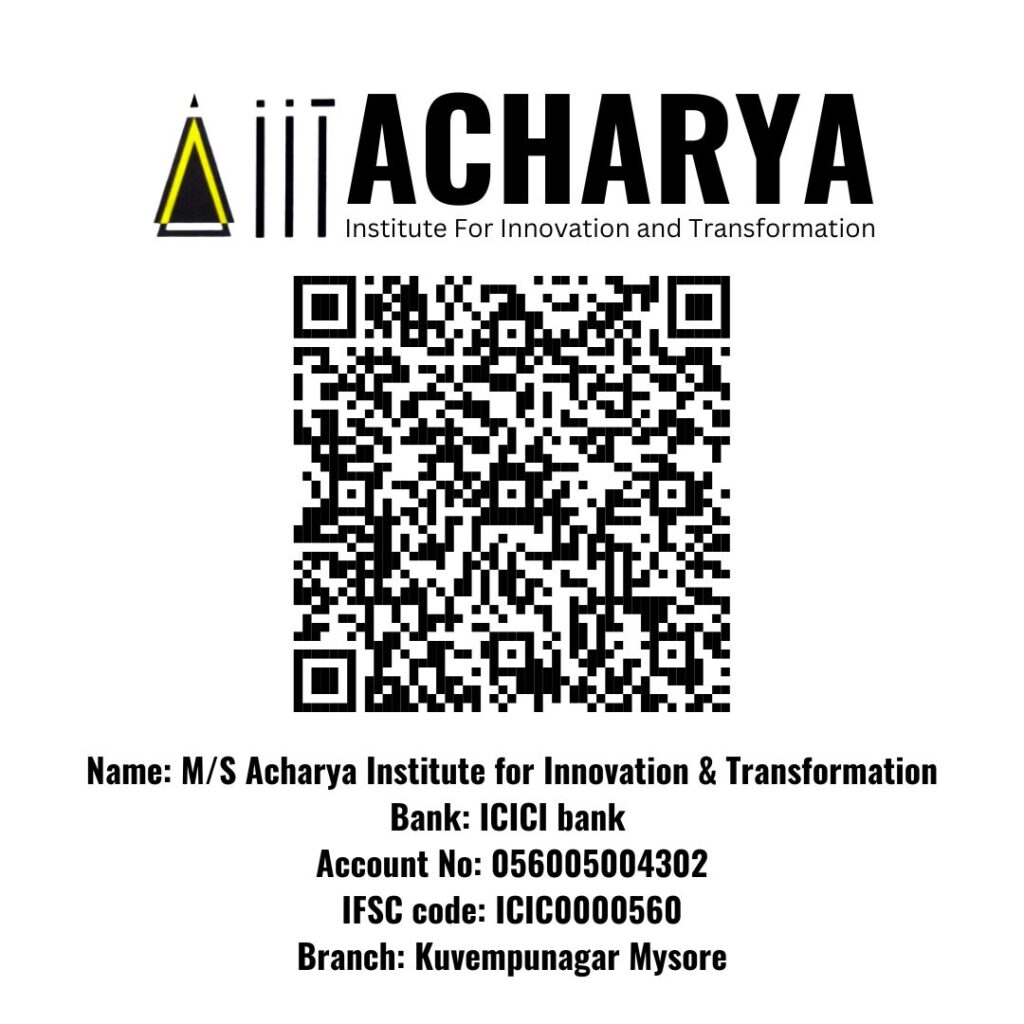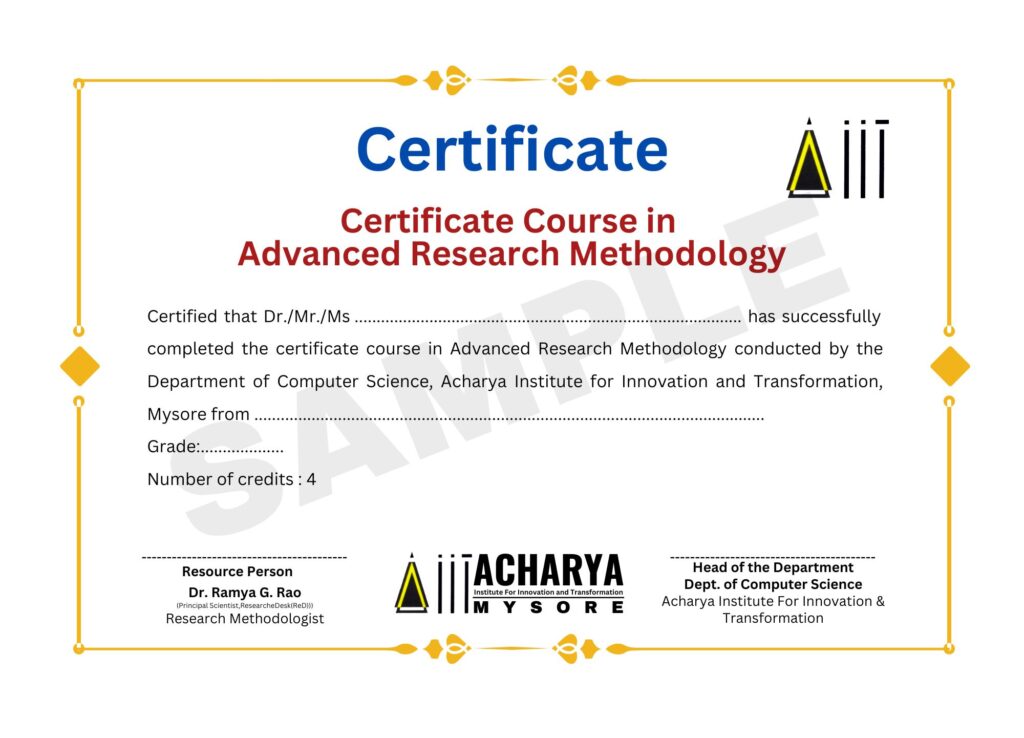
Advanced Research Methodologies – Online Course
Dr. Ramya G Rao | Resource Person
The Acharya Institute for Innovation and Transformation is proud to announce a 25-day course on “Advanced Research Methodologies,” led by the esteemed Dr. Ramya Rao. This intensive course is designed for researchers, scholars, and professionals who seek to deepen their understanding and application of advanced research techniques in their respective fields.
The Acharya Institute for Innovation and Transformation (AIIT) is a premier institution dedicated to fostering innovation, research, and academic excellence. AIIT stands as a beacon of advanced learning and a hub for cutting-edge research, aiming to bridge the gap between theoretical knowledge and practical application. Under the dynamic leadership of Prof. Ar. Sudhir Acharya, stands as a beacon of excellence in the realms of education and research. With a steadfast commitment to innovation, sustainability, and interdisciplinary collaboration, AIIT continues to inspire and equip the next generation of leaders, thinkers, and innovators.
The Advanced Research Methodologies course will be led by Dr. Ramya.G.Rao, our esteemed Principal Scientist at ResearcheDesk (ReD). Dr. Ramya Rao has an impressive academic background and extensive experience in research, with expertise in biochemistry, microbiology, and statistical modeling. Dr. Ramya Rao has published numerous high-impact research papers and has a wealth of experience conducting training sessions and workshops on various topics, including research methodology and data analysis. Her contributions to the scientific community are commendable, and we are privileged to have her expertise and knowledge at ResearcheDesk (ReD).
This 4 credit Advanced Research Methodologies course comprises 3 units to provide you an exposure to various Advanced Research Methodologies and related aspects through several video lectures, video demonstrations, text content, discussion forum, assignments, and self-assessment tools.
Summary
Course Status : Completed
Course Type : Online
Duration : 25 days
Credit Points : 4
Start Date : July 11, 2024
End Date : August 14, 2024
Enrollment Ends : July 14, 2024
Online Class Timing: 8PM to 10PM
Course Fee: Rs.5000/- Rs.2000/-
Scan & Pay / Online Transfer

Note: This exam date is subjected to change based on seat availability. You can check final exam date on your hall ticket.
Contact NC Support
info@acharya-iit.com
+91 99013 62200
Course layout
Unit 1 : Mechanics of Research Methodology
Introduction to the Course, Basic concepts:Types of research, Research approaches, Empirical research methods, Significance of research, Research design, Case study method, Sampling technique, Sources of data, Using a questionnaire, Selection of research problem, Conduct Literature Review.
Unit 2 : Selection and formulation of a research problem
Components, Selection and formulation of a research problem, Objectives of formulation, Criteria of a good research problem, Performing literature review on a topic.
Unit 3 : Hypothesis formulation
Criterion for hypothesis construction, Nature of Hypothesis, Need for having a working hypothesis, Characteristics of a hypothesis. Types of hypothesis, Concepts of hypothesis testing, Decision rule for hypothesis testing, Problem statement writing and developing research questions, Procedure for hypothesis testing, Parametric and non-parametric tests for hypothesis testing
Unit 4 : Research Design
The research framework, Meaning of research design, Need for research design, Characteristics of research design, Components of research design, Experimental and non-experimental designs, Developing objectives for research,Experimental and non-experimental hypothesis testing research,Classification schemes for research design, Research design perspectives and applicability, Principles of experimental designs, Writing rationale for a research
Unit 5 : Sampling Method
Probability or random sampling, Cluster sampling, Area sampling, Multi-stage sub-sampling, Random sampling with probability proportional to size, Replicated or interpenetrating sampling, Non-probability sampling, Explain research methodology with respect to a research problem, Convenience or accidental sampling, Purposive sampling, Quota sampling, and Snow ball sampling
Unit 6 : Data Analysis
Sources of data, Collection of data, Measurement and scaling technique, Collection of data from appropriate sources (primary and secondary), Correlation and causation, Classification of quantitative analysis, Selection and analysis of multi-variate methods, Multiple regression, Multiple regression analysis, Multivariate analysis of variance, Canonical correlation analysis, Factor analysis, Cluster analysis, Multi-dimensional scale, Performing data analysis and presentation of results, Case study method, Design of experiments, Artificial neural networks and Modelling and simulation.
Unit 7 : Thesis Writing and Journal Publication
Format: General format of Cover page, Dedication, Certificate, Declaration, Drawing inferences and implications from a study. Acknowledgement, Abstract, List of contents, List of figures, List of tables, Appendices and References.,Preparation of a research report, Contents of thesis: Background to research, Literature review Problem statement, Objectives of research, Rationale for the study, Motivation to the study, Methods, Definitions, Structural models, Theoretical models, Presentation of research work, Research Design & Analysis, Results, Findings, Implications, and Contributions, Significance of research, and Conclusion, Mechanics of writing papers in Journals, Writing a journal paper.
References
- John W. Creswel, Research Design: Qualitative, Quantitative, and Mixed Methods Approaches, 4th Ed., SAGE, 2018.Geoffrey R. Marczyk, David DeMatteo & David Festinger, Essentials of Research Design and Methodology, John Wiley & Sons, 2005.
- Dr Ranjit Kumar, Research Methodology: A Step-by-Step Guide for Beginners, SAGE, 2014.
- Suresh C. Sinha and Anil K. Dhiman, Research Methodology (2 Vols-Set), Vedam Books, 2006.
- C. R. Kothari and Gaurav Garg, Research Methodology: Methods and Techniques, New Age International Publisher, 2014.
- Boris Blumberg, Donald R Cooper & Pamela S Schindler, Business Research Methods, McGraw Hill International, 2014.
- R. Pannershelvam, Research Methodology, Prentice Hall, India, 2014
- Manfred Max Bergman, Mixed Methods Research, SAGE Books, 2006.
- Paul S. Gray, John B. Williamson, David A. Karp, John R. Dalphin, The Research Imagination, Cambridge University press, 2007.
- Cochrain & Cox, Experimental Designs, II Edn. Wiley Publishers, 2006
Course certificate
To obtain a certificate, the learner must register and take the proctored exam in person at one of the designated exam centers. The registration URL will be announced by AIIT once the registration form becomes available. To receive the certification, you need to complete the online registration form and pay the examination fee. Additional details, including any updates, will be provided upon the publication of the exam registration form. For more information about the exam locations and the terms associated with completing the form, please refer to the form itself.
Grading Policy:
Course Outcomes (COs)
| At the end of this course, the student should be able to: | No. of Contact Hours | Marks |
| Classify various research schemes. | 3 | 8 |
| Identify the characteristics and essential features of a research problem. | 3 | 8 |
| Hypothesize and formulate a research problem. | 8 | 16 |
| Select the appropriate research design. | 4 | 12 |
| Apply relevant research methodologies, tools and techniques. | 17 | 36 |
| Write journal/conference paper and thesis in specified format. | 13 | 20 |
| Total | 48 | 100 |
| C% of Marks | 85-100 | 75-84 | 65-74 | 55-64 | 50-54 | <50 |
| Grade | A+ | A | B | C | D | F |
| Grade Value | 10 | 9 | 8 | 7 | 6 | 0 |
Certificate
